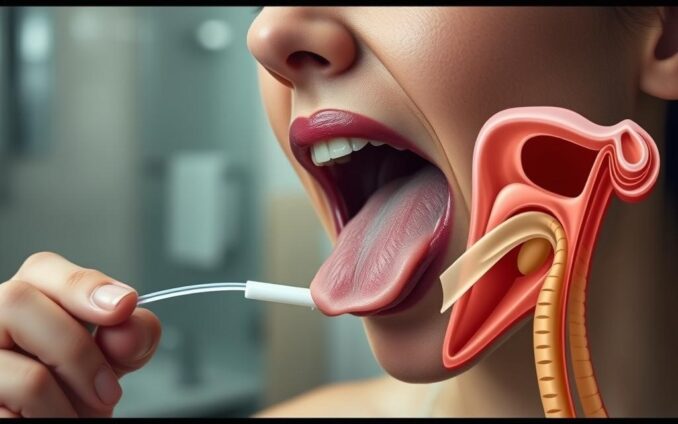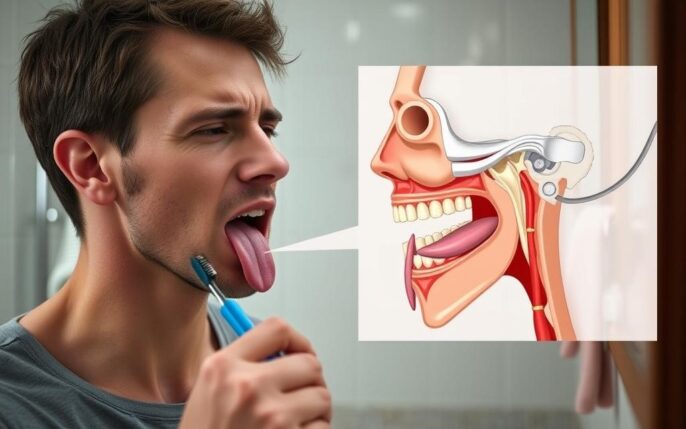Are you experiencing jaw pain after your tongue-cleaning routine? It might seem surprising, but there’s a potential connection between tongue cleaning causing TMJ (temporomandibular joint) symptoms. Many people overlook this link, thinking that oral hygiene practices are harmless. However, improper techniques or excessive force can lead to uncomfortable flare-ups in the jaw area. In this article, we’ll explore how tongue cleaning could be causing your TMJ issues, identify the symptoms to watch for, and provide effective solutions to alleviate discomfort while maintaining optimal oral health. Let’s dive deeper into the world of TMJ and discover what you need to know!
Tongue Cleaning Causing TMJ: Causes, Symptoms, and Solutions
Tongue cleaning is essential for oral hygiene, but it can inadvertently lead to TMJ issues. Excessive pressure or improper technique while scraping the tongue may strain the jaw muscles and joints, triggering pain and discomfort.
Symptoms of TMJ related to tongue cleaning include jaw pain, clicking sounds during movement, headaches, and difficulty opening the mouth fully. Many individuals might not recognize these signs as linked to their tongue-cleaning habits.
To address this issue, focus on gentle techniques when cleaning your tongue. Use a soft brush or scraper designed specifically for this purpose. Additionally, incorporating relaxation exercises for your jaw can help manage symptoms effectively without compromising your oral health routine.

A Refresher on TMJ Flare-ups
TMJ, or temporomandibular joint disorder, affects the joints connecting your jaw to your skull. When these joints become inflamed or injured, it can lead to painful flare-ups. Common symptoms include jaw pain, headaches, and difficulty chewing.
Flare-ups can be triggered by various factors like stress, teeth grinding, or even poor posture. These triggers often cause muscle tension around the jaw area. As a result, everyday activities may become uncomfortable.
Understanding TMJ flare-ups is essential for effective management. Recognizing early signs can help mitigate pain and discomfort before they escalate into more severe issues. Awareness of personal triggers empowers individuals to seek timely treatment options that suit their specific needs.
Why Tongue Cleaning Can Lead to TMJ Symptoms
Tongue cleaning is essential for oral hygiene, but it can inadvertently contribute to TMJ symptoms. When individuals use excessive pressure or incorrect techniques while scraping their tongues, they may strain the jaw muscles. This tension can lead to discomfort and inflammation in the temporomandibular joint.
Additionally, if a person clenches their jaw during tongue cleaning, this habit increases stress on the TMJ. Over time, this repetitive motion can intensify existing issues or create new ones within the joint and surrounding muscles.
Moreover, using certain tools that are too rigid or sharp may cause physical irritation to sensitive areas of the mouth, which could further exacerbate TMJ-related pain. It’s important to practice gentle tongue cleaning methods to minimize these risks effectively.
Identifying the Link Between Tongue Cleaning and TMJ
TMJ, or temporomandibular joint disorder, can manifest in various ways, including jaw pain and discomfort. Recent observations have noted a potential connection between tongue cleaning practices and TMJ symptoms. Many people use scrapers or brushes to maintain oral hygiene; however, excessive force during this process may inadvertently strain the jaw muscles.
When tongue cleaning is done aggressively, individuals might clench their teeth or tense their jaws. This unintentional muscle contraction can exacerbate existing TMJ issues or even trigger new ones. Over time, these repetitive motions contribute to inflammation around the joint.
Understanding this link emphasizes the importance of gentle techniques when performing oral care routines. Being mindful of how you clean your tongue could help mitigate the risk of developing TMJ-related pain.
Other Causes of TMJ Symptoms
TMJ symptoms can stem from various sources beyond tongue cleaning. One common cause is teeth grinding, also known as bruxism. This often occurs during sleep and puts excessive pressure on the jaw muscles and joints.
Additionally, stress plays a significant role in TMJ disorders. High-stress levels can lead to muscle tension and clenching of the jaw, exacerbating pain and discomfort over time. Chronic stress might make it difficult for individuals to relax their facial muscles.
Injury or trauma to the jaw can also result in TMJ problems. Accidents that dislocate or fracture the jaw may lead to inflammation and painful symptoms long after the initial injury has healed. Recognizing these factors is crucial for effective management of TMJ-related issues.
Factors Contributing to TMJ Flare-ups
Several factors can contribute to TMJ flare-ups, making it essential to understand their impact. Stress is a significant contributor, often leading individuals to clench or grind their teeth unconsciously. This tension in the jaw muscles can exacerbate existing issues.
Poor posture also plays a role in TMJ discomfort. Slouching or hunching over can strain the neck and jaw, creating misalignment that triggers pain. Ergonomics matter; maintaining proper alignment while working or using devices can alleviate pressure on your jaw joint.
Additionally, habits such as chewing gum excessively or biting nails may further irritate an already sensitive area. Awareness of these behaviors is crucial for managing symptoms and preventing flare-ups effectively. Recognizing these contributing factors empowers you to take action against TMJ-related discomfort.
Managing TMJ Symptoms before Tongue Cleaning
Managing TMJ symptoms before engaging in tongue cleaning is crucial for maintaining comfort. Start by practicing relaxation techniques such as deep breathing or gentle stretching of the jaw. These methods can help alleviate tension that often exacerbates TMJ issues.
Next, consider your posture during tongue cleaning. Maintaining an upright position while avoiding excessive clenching of the teeth can make a significant difference in reducing strain on your jaw muscles.
Additionally, applying a warm compress to the jaw area can provide immediate relief from pain and stiffness. This simple step prepares your muscles for any oral care routine, including tongue cleaning, allowing you to proceed without discomfort.
Solutions to Alleviate TMJ Pain
Managing TMJ pain can often be achieved through a combination of self-care and professional treatments. Gentle jaw exercises can help improve flexibility and reduce discomfort. Focus on slow movements to avoid aggravating the joint.
Applying heat or cold packs to the affected area provides immediate relief. Heat helps relax muscles, while cold reduces inflammation. Alternate between both for optimal results.
Additionally, over-the-counter pain relievers like ibuprofen or acetaminophen may alleviate symptoms temporarily. However, consult with your healthcare provider before starting any medication regimen. Regular dental check-ups are crucial as well; your dentist might recommend a custom mouthguard if teeth grinding is contributing to your TMJ issues.
Proper Diagnosis and Treatment for Tongue Cleaning-Related TMJ
Proper diagnosis is crucial for addressing tongue cleaning-related TMJ issues. A dental professional can evaluate your jaw, teeth alignment, and overall oral health. They may also inquire about your tongue-cleaning habits to pinpoint potential causes of discomfort.
Once diagnosed, treatment options vary based on severity. Conservative measures like applying heat or ice packs can alleviate immediate pain. Additionally, adjusting tongue cleaning techniques may be necessary to prevent future flare-ups.
For persistent cases, a dentist might suggest physical therapy or custom mouthguards to relieve pressure on the jaw joint. In rare instances, surgical interventions could provide lasting relief if conservative treatments fail to yield results. Regular follow-ups will ensure you’re on the right track towards recovery and comfort in managing TMJ symptoms linked to tongue cleaning practices.
Conclusion
Tongue cleaning is often overlooked in discussions about oral hygiene, but it can have unexpected consequences. For some individuals, the act of cleaning the tongue may exacerbate existing TMJ conditions or trigger new symptoms. Understanding this connection is vital for anyone who practices rigorous oral care.
By recognizing potential triggers and managing TMJ symptoms beforehand, individuals can continue to maintain their oral health without risking discomfort. Engaging with a healthcare professional for proper diagnosis and treatment ensures that any TMJ-related issues are addressed effectively.
To mitigate the risk of tongue cleaning causing TMJ pain, it’s essential to adopt gentle techniques along with appropriate dental tools. Keeping an eye on posture during tongue cleaning sessions also plays a role in minimizing strain on jaw muscles. Prioritizing your overall well-being is key; don’t hesitate to reach out for help if you notice persistent discomfort.
Being informed allows you to take proactive steps toward maintaining both your oral hygiene and jaw health seamlessly.


